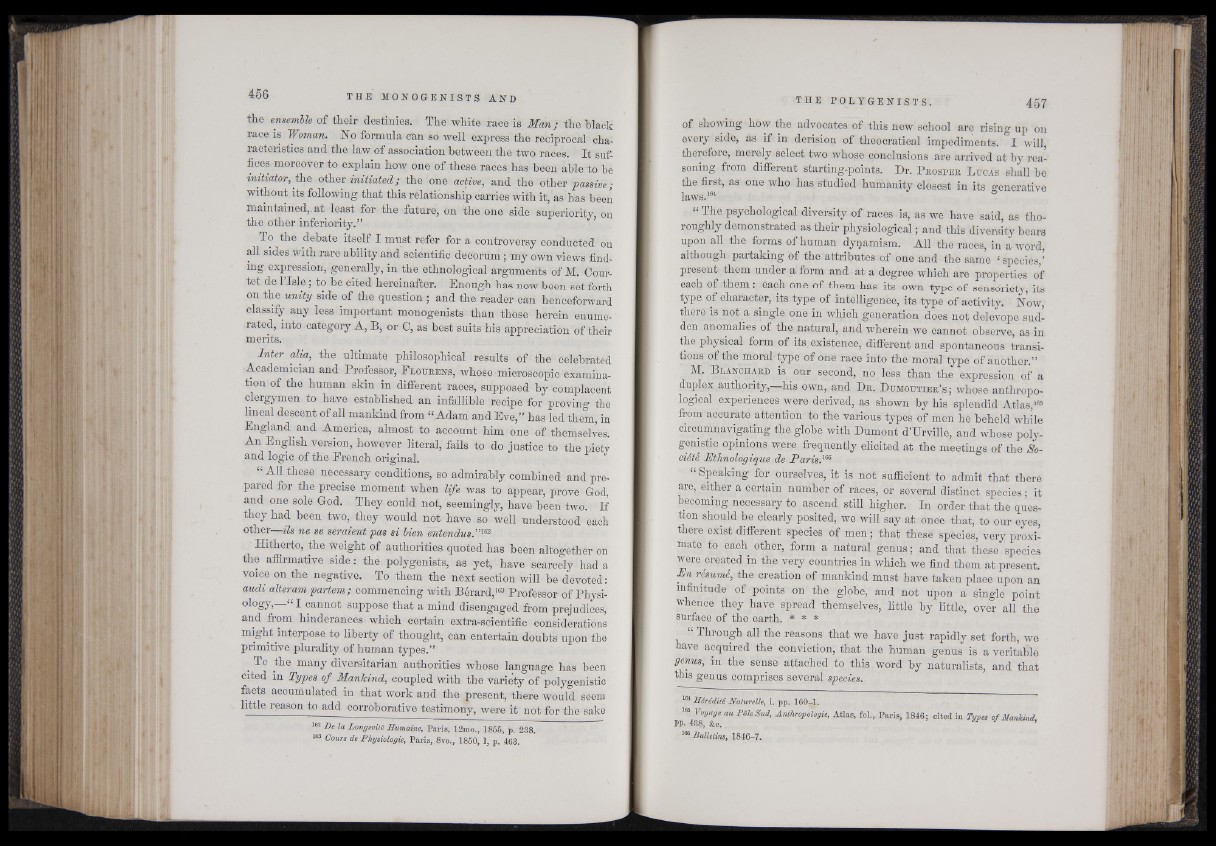
the ensemble of their destinies. The white race is Man; the black
race is Woman. Ho formula can so well express the reciprocal cha-
racteiistics and the law of association between the two races. It suffices
moreover to explain how one of these raees has been able to be
initiator, the other initiated; the one active, and the other passive ;
without its following that this relationship carries with it, as has been
maintained,, at least for the future, on the one side superiority, on
the other inferiority.”
To the debate itself I must refer for a controversy conducted on
all sides with rare ability and scientific decorum ; my own views finding
expression, generally, in the ethnological arguments of M. Cour-
tet de l’lsle ; to be cited hereinafter. Enough has now been set forth
on the unity side of the question ; and the reader can henceforward
classify any less important monogenists than those herein enumerated,
into category A, B, or Ç, as best suits his appreciation of their
merits.
Inter alia, the ultimate philosophical results of the celebrated
Academician and Professor, F louEe n s , whose microscopic examination
of the human skin in different races, supposed by complacent
clergymen to have established an infallible recipe for proving the
lineal descent of all mankind from “Adam and Eve,” has led them, in
England and America, almost to account him one of themselves.
An English version, however literal, fails to do justice to the piety
and logic of the Erench original.
“ All these necessary conditions, so admirably combined and prepared
for the precise moment when life was to appear, prove God,
and one sole God. They could not, seemingly, have been two. If
they had been two,^ they would not have so well understood each
other—ils ne se seraient pas si bien entendus.”162
Hitherto, the weight of authorities quoted has been altogether on
the affirmative side : the polygenists, as yet, have scarcely had a
voice on the negative. To them the next section will be devoted:
audi alteram partem; commencing with Bérard,163 Professor'of Physiology
» “ I cannot suppose that a mind disengaged from prejudices,
and from hinderances which certain extra-scientific considerations
might interpose to liberty of thought, can entertain doubts upon the
primitive plurality of human types.”
To the many diversitarian authorities whose language has been
cited in Types of Mankind, coupled with the variety of polygenistic
facts accumulated in that work and the present, there would seem
little reason to add corroborative testimony, were it not for the sake
162 De la Longévité Surname, Paris, 12mo., 1855, p. 238.
163 Court de Physiologie, Paris,.8 y o . , 1850, 1, p. 463.
of showing how the advocates of this new school are rising up 011
every side, as i f in derision of theocratical impediments. I will,
therefore, merely select two whose conclusions are arrived at by reasoning
from different starting-points. Dr. P rosper L ucas shall be
the first, as one who has studied humanity closest in its generative
laws.191 .1. : j f p 5
“ The psychological diversity of races is, as we have said, as thoroughly
demonstrated as their physiological ; and this diversity bears
upon all the forms of human dyçamism. All the races, in a word,
although partaking of the attributes of one and the same ‘species,’
present' them under a form and at a degree which are properties of
each of them : each one of them has its own type of sensdriety, its
type of character, its type of intelligence, its type of activity. How,
there is not a single one in which generation does not delevope sudden
anomalies of the natural, and wherein we cannot observe, as in
the physical form of its. existence, different and spontaneous transitions
of the moral type of one race into the moral type of another.”
M. B lanchard is our second, no less than the expression of a
duplex authority,—-his own, and D r . D umoutier’s ; whose anthropological
experiences were derived, as shown by his splendid Atlas,165
from accurate attention to the various types of men he beheld while
Circumnavigating the globe with Dumont d’Urville, and whose polygenistic
opinions were frequently elicited at the meetings of the Société
Ethnologique de Paris.166
“ Speaking for ourselves, it is not sufficient to admit that there
are, either a certain number of races, or several distinct species ; it
becoming necessary to ascend still higher. In order that the question
should be clearly posited, we will say at once that, to our eyes,
there exist different species of men; that these species, very proximate
to each other, form a natural genus; and that these species
were created in the very countries in which we find them at present.
En résumé, the creation of mankind must have taken place upon an
infinitude of points on the globe, and not upon a single point
Whence they have spread themselves, little by little, over all the
surface of the earth. * * *
“ Through all the reasons that we have just rapidly set forth, we
have acquired the conviction, that the human genus is a veritable
genus, in the sense attached to this word by naturalists, and that
this genus comprises several species.
154 Sérêditê Naturelle, i. pp. 160^.
m Voyage au PôleSud, Anthropologie, Atlas, fol., Paris, 1846; cited in Types of Mankind
PP- 488, &c..
166 Bulletins, 1846-7.